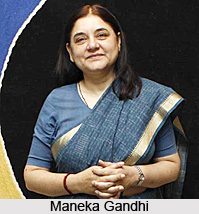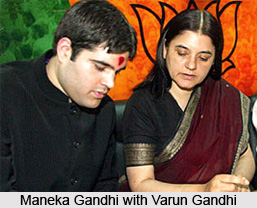 Maneka Gandhi is the Indian Union Cabinet Minister for Women and Child Development in government of Narendra Modi, animal rights activist, former journalist, and environmentalist. She has been a minister in four governments, and has authored a number of books concerning the areas of etymology, law and animal welfare. Maneka Gandhi, though not attached much with the political scenario of Nehru-Gandhi Family, is popular for her own strong views and hold in Indian social welfare committees.
Maneka Gandhi is the Indian Union Cabinet Minister for Women and Child Development in government of Narendra Modi, animal rights activist, former journalist, and environmentalist. She has been a minister in four governments, and has authored a number of books concerning the areas of etymology, law and animal welfare. Maneka Gandhi, though not attached much with the political scenario of Nehru-Gandhi Family, is popular for her own strong views and hold in Indian social welfare committees.
Early Life of Maneka Gandhi
Maneka Gandhi was born in a Sikh family on 26 August 1956 to Lt. Col. Tarlochan Singh Anand and Amardeep Kaur Anand in Delhi. She completed her education at the prestigious Lawrence School, Sanawar and later at Lady Shri Ram College for Woman in New Delhi. There she earned an ISC. She enrolled in modelling for Bombay Dyeing and there she met Sanjay Gandhi.
Political Career of Maneka Gandhi
Maneka Gandhi was the Founder Editor of Surya, political news monthly. She entered politics in 1982 after her husband"s death in a plane crash. She was the campaigner in the case of Maneka Gandhi vs. Union of India, a 1979 case involving freedom of movement. Maneka Gandhi formed her own political party, the Sanjay Vichar Manch ("Platform for Sanjay`s Thought") in 1983 that focused on youth empowerment and employment. The Manch won 4 out of the first 5 seats it contested-in the state elections of Andhra Pradesh.
In 1988, Maneka merged the Rashtriya Sanjay Manch with the main opposition party, the Janata Dal and became its General Secretary. She joined the Janata Dal (Secular) in 1988. She was elected as the general secretary of Janata Dal during 1988-1989. She won her first election in 1989 and served as Minister of the Environment from 1989 to 1991 in the cabinet of Vishwanath Pratap Singh. Maneka Gandhi created the Department for Animal Welfare and served as its Minister along with her other commitments. While she was Minister for Social Justice and Empowerment, Maneka Gandhi actively participated in the Indian pension reforms effort, through the early phase of Project OASIS. OASIS is an acronym for Old Age Social and Income Security. Maneka Gandhi played the major role in the initiation and early thinking on these issues, going up to the point where it was transferred to the Ministry of Finance for implementation.
 Maneka Gandhi as an Environmentalist
Maneka Gandhi as an Environmentalist
Maneka Gandhi is an environmentalist who brought the issue of animal rights into mainstream. She was appointed chairwoman of the Committee for the Purpose of Control and Supervision of Experiments on Animals (CPCSEA) in 1995. The CPCSEA gradually imposed restrictions that brought some of the abuse to a stop. She started the organisation People for Animals in 1992 and it is the largest organisation for animal welfare in India. Maneka Gandhi also anchored a weekly Television program named "Heads and Tails" highlighting sufferings meted out to animals due to their business exploitation. Maneka Gandhi runs an NGO named "People for Animals", which has its shelters across India. Maneka introduced a number of historic legislations including the Coastal Zone Regulation Act and The Public Liability Act for Hazardous Chemicals. She also formed the National Zoo Authority for the regulations of the zoos.
Positions held by Maneka Gandhi
•1988-89 - General-Secretary, Janata Dal (J.D.)
•1989 - Elected to 9th Lok Sabha (1st term) From Pilibhit parliamentary constituency
•1989-91 - Union Minister of State (Independent Charge), Environment and Forests
•Jan-April 1990 - Union Minister of State (Independent Charge), Programme Implementation
•1996 - Re-elected to 11th Lok Sabha (2nd term) From Pilibhit parliamentary constituency
•1996-97 - Member, Committee on Science and Technology, Environment and Forests
•1998 - Re-elected to 12th Lok Sabha (3rd term) From Pilibhit parliamentary constituency
•1998-99 - Union Minister of State (Independent Charge) Social Justice and Empowerment
•1999 - Re-elected to 13th Lok Sabha (4th term) From Pilibhit parliamentary constituency
•13 October 1999- 1 September 2001- Union Minister of State, Social Justice and Empowerment (Independent Charge)
•1 September 2001- 18 November 2001 - Union Minister of State, Culture with additional charge of Animal Care (Independent Charge) Programme Implementation and Statistics with additional charge of Animal Care (Independent Charge)
•18 Nov 2001- 30 June 2002 - Union Minister of State, Programme Implementation and Statistics with additional charge of Animal Care (Independent Charge)
•2002-2004 - Member, Committee on External Affairs
•2004 - Re-elected to 14th Lok Sabha ( 5th term), Member, Committee on Health and Family Welfare, Member, Consultative Committee, Ministry of Environment and Forests From Pilibhit parliamentary constituency
•5 August 2007 - onwards Member, Committee on Health and Family Welfare
•16 May 2009 - Re-elected to 15th Lok Sabha (6th term) From Aonla parliamentary constituency
•31 Aug 2009 - Became Member of Committee on Railways
•23 Sep 2009- Chairperson, Committee on Government Assurances
•19 Oct 2009- Member, General Purposes Committee
•26 May 2014 - Union Minister of Women and Child Development
Awards and Recognitions of Maneka Gandhi
•Lord Erskine Award from the RSPCA, 1992
•Environmentalist and Vegetarian of the year 1994
•Marchig Animal Welfare Trust Prize, Switzerland, 1997
•Bhagwan Mahaveer Award for Excellence in sphere of Truth, Non-violence and Vegetarianism, 1999
•Prani Mitra Award, 1996
•Maharana Mewar Foundation Award, 1996 for Environmental work
•Venu Menon Animal Allies Foundation Lifetime Achievement Award, 1999
•Ahimsa and Sadbhawna Award, 1999
•Dewaliben Charitable Trust Award, 1999
•International Women"s Association Woman of the Year Award, Chennai, 2001
•A.S.G. Jayakar award, 2008
Personal Life of Maneka Gandhi
Maneka Gandhi is a former model and editor of Surya India magazine. Maneka was the wife of Sanjay Gandhi, son of Indira Gandhi. The name of her son is Varun Gandhi. Maneka is a superb writer and penned many books like Etymological Directories; Plant Mythology; Animal Activism and Laws and many others. She is an active member of Worldwide Fund for Nature (WWF) and a trustee of Sanjay Gandhi Animal Care Shelter and Hospital.






